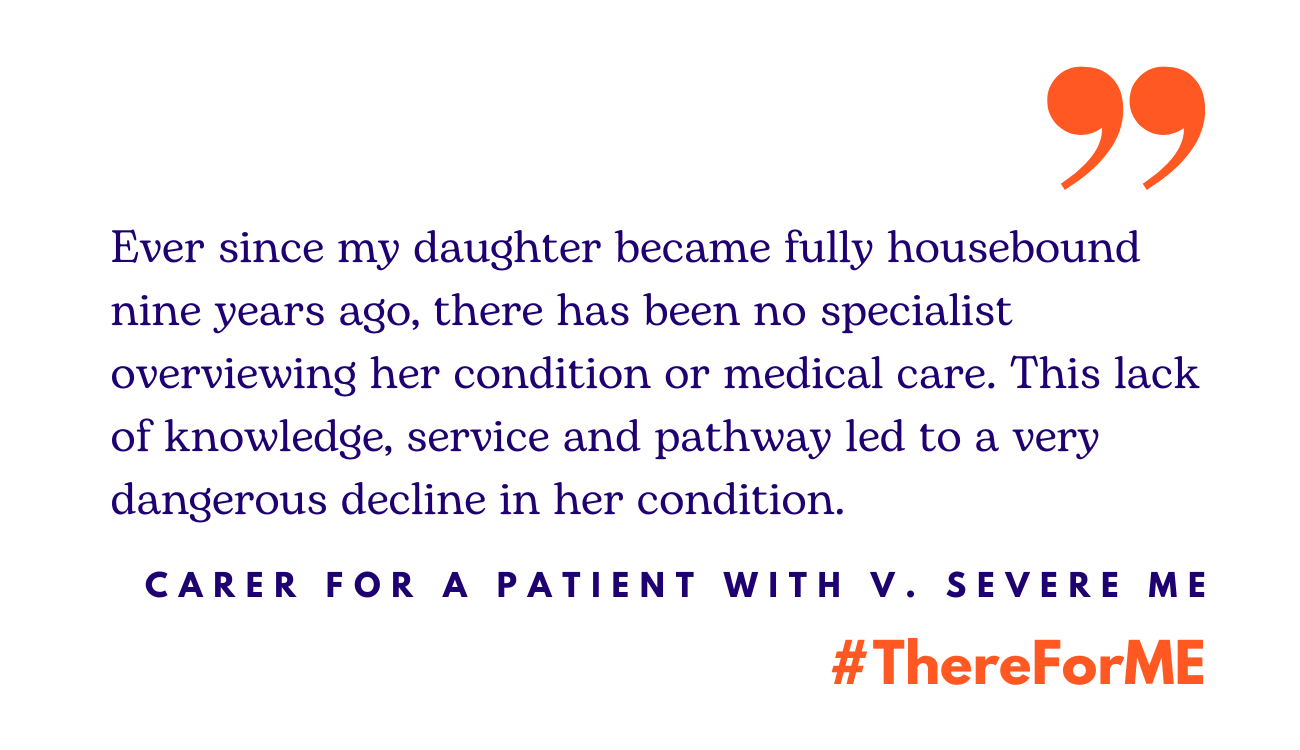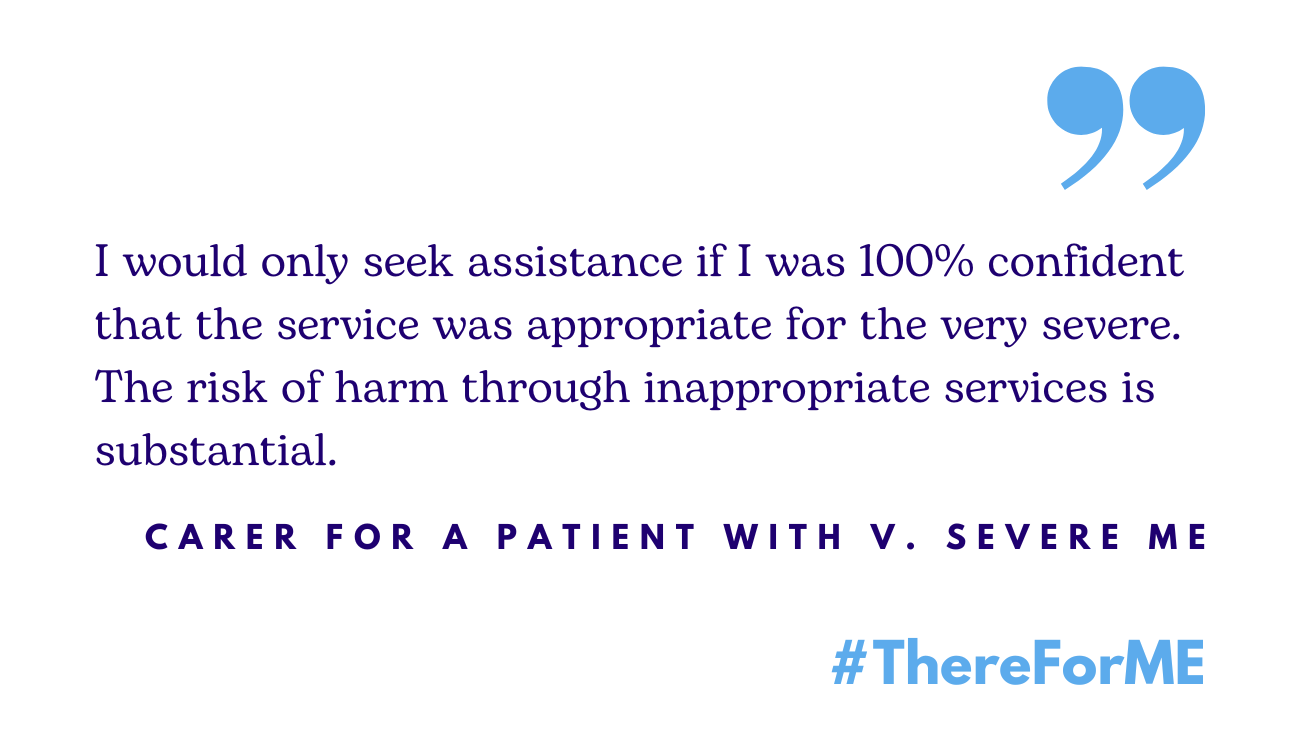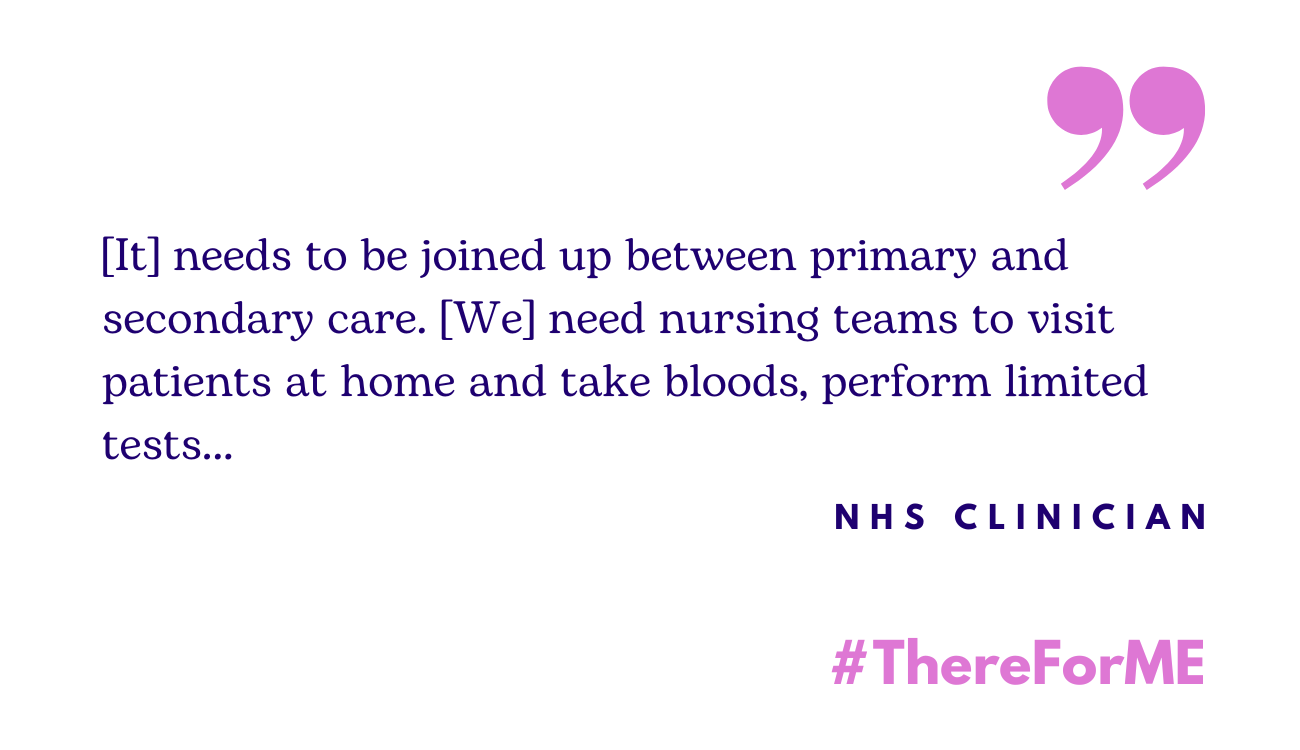Commissioning an NHS service for very severe ME
Perspectives from carers and clinicians
The government’s new Delivery Plan for ME, published in July, commits the Department of Health and Social Care, together with NHS England, to “explore whether a specialised service should be prescribed by the Secretary of State for Health for very severe ME/CFS".
Our regular readers will know that this is an issue we’ve been following with interest. People with very severe ME have a shockingly poor quality of life. Yet at present there are no specialist NHS services anywhere in the country equipped to meet their needs. Is that set to change? So far, the government’s answer is a solid ‘wait and see’.
We believe that people with the greatest experience supporting people with ME — that is, the family and friends caring for them, and the clinicians supporting them — should be at the heart of the government’s decision making. So, over the past couple of weeks we’ve surveyed some carers and clinicians for their thoughts on whether a service should be commissioned, and if so what it should look like. Here’s what we’ve heard so far.
About our survey
Our sample is intentionally small. Given the variety of ME scales, we wanted to be certain that all respondents had experience supporting those with very severe ME as per the 2021 NICE Guideline, i.e. “People with very severe ME/CFS are in bed all day and dependent on care. They need help with personal hygiene and eating, and are very sensitive to sensory stimuli. Some people may not be able to swallow and may need to be tube fed.” This meant that we distributed the survey through our networks rather than sharing it openly online. While the sample isn’t huge, we’re confident we’ve captured relevant perspectives. This process highlighted that a clear and consistently applied definition will be needed to provide a threshold for eligibility for a standalone service for very severe ME.
In total, 27 people responded to our survey: 17 carers and 10 clinicians. All but two were based in England. While the Delivery Plan focuses on England, we accepted responses from those across the UK, given the importance of developing a shared UK-wide approach.
Who is supporting these patients now?
First, we asked carers to identify which professionals provided regular support to the person they cared for. The most common responses were private specialists or an NHS GP, followed by NHS community teams. Notably, less than half were regularly supported by NHS teams in the community, despite an extremely high level of needs. Some commented that the support received in the community or from their GP was not especially meaningful. Unsurprisingly, given the lack of services, no respondents noted regular support from an NHS specialist clinic, and two respondents said that they were not receiving any regular medical support at all.
The responses made clear the huge responsibility that currently rests on the shoulders of family and friends caring for their loved ones. On average, the carers were providing 144 hours of unpaid care per week. Some spoke about providing 24/7 care for years with few or no breaks. A little less than half were receiving support from paid carers, with a small number reporting that this was covered by NHS Continuing Healthcare or council funding. Some were covering care costs from their own private finances.
Should the Health Secretary commission a service for very severe ME?
We asked both clinicians and carers whether the health secretary should commission a service for very severe ME. The answer was a unanimous “yes”, with a common reason being the complete lack of specialised NHS support for this group of patients.
Many felt that a specialist service was crucial in order to minimise potential harms. Clinicians and carers spoke about recent preventable deaths, patients’ traumatic experiences in hospitals, and cases of deterioration due to harmful advice or late interventions. Some commented that GPs — many of whom want to help their patients — have nowhere within the NHS to turn for specialist advice.
Some also noted that privilege currently plays a role in determining patient outcomes, explaining that an NHS service is needed because not everyone can afford private care (currently the only form of specialist support), nor does everyone have friends or family able to care for them.
“There is currently nothing! Ever since my daughter became fully housebound nine years ago there has been no specialist overviewing her condition or medical care. This lack of knowledge, service and pathway led to a very dangerous decline in her condition when she lost the ability to swallow, was admitted to hospital as an emergency and subjected to a torturous 13 week [hospital] stay, which eventually led to a J-tube being inserted.” - Carer for a patient with very severe ME
“Those with very severe ME are among the most overlooked and dismissed people in society. The suffering is needless and preventable. Solutions to this rely on recognising the nature and scale of the problem, measuring what is important and having the political will to make the necessary changes.” - Carer for a patient with very severe ME
“These patients are incredibly sick, and when they reach out for expert care and a care pathway on the NHS - it simply just does not exist. And young people have died because of it. Also the lack of education and training in post viral disease in the UK means patients [...] often report feeling neglected, dismissed, disbelieved and gaslighted. Often they are given the wrong advice which can and does result in a deterioration in their condition.” - NHS clinician
Building trust
While the call for a specialist NHS service for very severe ME was unanimous, when asked if they would be likely to use such as a service, all but one of the carers we consulted responded “it depends”. It was clear from the responses that previous experiences of NHS care have led to mistrust in its safety and quality. Most said they would be unsure about accessing a specialist service due to the risk of inappropriate care causing harm to their loved one. Factors that would encourage carers to access specialist care included being provided with clear information about who was involved in the service, including their level of knowledge and experience, and what the service could offer.
Many felt it should be made clear that the service was taking a biomedical approach, building on the latest research and evidence, and was not informed by psychosocial perspectives. Two respondents specifically noted that a service run by BACME clinicians (who are associated with existing approaches) was unlikely to be trusted. Another suggested collaboration with clinicians who are already supporting patients (and trusted by them), particularly those working in the private sector, in the design and delivery of the service.
“It depends on how good and suitable the service is they set up and what they can offer. Patients that have very severe ME are extremely vulnerable so if the service isn't suitable it could be life threatening.” - Carer for a patient with very severe ME
“I would only seek assistance if I was 100% confident that the service was appropriate for the very severe. The risk of harm through inappropriate services is substantial.” - Carer for a patient with very severe ME
“I would need to feel confident that the assistance would be appropriately skilled, supportive and ultimately likely to be of benefit.” - Carer for a patient with very severe ME
For some, wider action on ME throughout the NHS and across government — such as the training of healthcare workers and an apology for previous approaches — would play a role in building trust in specialist services. For others, the service ‘doing a good job’ and generating positive feedback from users would help to build confidence. Both carers and clinicians felt that a clear approach of listening to and respecting both patients and carers was critical to building trust in any specialist service.
“Once trust is lost it is exceptionally difficult to rebuild. Burnt child shies the fire…I would require to see evidence not only of the specific services commissioned, including level of expertise from support staff but very much also consistent evidence from others of lived, positive personal experiences with such services. In short, it would take a lot!” - Carer for a patient with very severe ME
“By doing a good job! Demonstrating thorough knowledge of the condition, listening to patients and their carers, accommodating their needs eg doing home visits, seeking specialist advice where necessary, treating any coexisting medical conditions and coordinating a team around the patient providing holistic care.” - NHS clinician
“There is a small group of long term physicians and new emerging physicians that this patient community DO trust and having us involved in an advisory capacity either routinely or via a Martha’s Law request would help build trust in the patient/carer community.” - Private clinician
“Make it abundantly clear the model of ME the service is informed by. Have a strong patient and carer advisory panel that has a voice in the planning. Make an unreserved public apology for the very many thousands of lives that have been ruined by the previous psychologically based paradigm.” - Carer for a patient with very severe ME
What would support from this service look like?
We also asked the carers and clinicians what kind of support the service should provide if it were commissioned. Some suggestions received unanimous support: access to medication for symptom management, access to off-label and emerging treatments, coordination with GP and community teams, emergency support (for example, virtual wards and coordination of hospital care), support with nutrition and hydration, and treatment of common co-morbidities such as POTS and MCAS.
Other suggestions receiving near unanimous approval included access to specialist nursing, remote at-home tests and investigations, support with Continuing Healthcare funding, information and advice for carers, and participation in research and clinical trials. Most backed the idea of offering referrals to specialist clinicians, with suggestions including gastroenterology, neurology, cardiology, haematology and pain clinics. However, it was highlighted that specialists should be appropriately informed about very severe ME in advance of consultations and prepared to make necessary adjustments.
Noticeably, the types of support that respondents had most mixed opinions about reflected what is currently available from existing NHS ME/CFS clinics (which typically do not treat very severe patients). This included advice for managing symptoms, support with welfare benefits, occupational therapy, psychological support and physiotherapy (with the latter two the least commonly selected). Support for these forms of support was more qualified than other options, particularly among carers. For example, some felt these could be valuable if delivered by clinicians with appropriate knowledge, while others cautioned about the potential for interventions to be unhelpful or even harmful.
“In some cases, psychological support and physio will be relevant due to comorbidities or secondary issues but unlikely to be appropriate for the very severe - other than in a consultative capacity.” - Carer for a patient with very severe ME
“People with very severe ME are too ill to benefit from some of the interventions, eg OT, physiotherapy, advice re pacing etc. They are too ill to interact with healthcare professionals.” - Carer for a patient with very severe ME
“Physios who understand very severe ME can offer appropriate support to help patients avoid bed sores and contractures.” - Carer for a patient with very severe ME
Carers and clinicians also shared their own ideas for what could be offered. Some spoke about assistance for carers such as mental health support. Others prioritised provision of home IV saline. There were recommendations for specific at-home testing, including remote sleep studies and alternative forms of testing (such as urine, saliva and stool tests) for patients for where drawing blood is difficult or hard to tolerate due to sensitivities. While some stressed the need for the service to have some capacity for in-patient care, others pointed to the need primarily for local and community support. They recognised that, except in life-threatening emergencies, most patients will be best supported from home. Other suggestions included at-home dental visits, home care packages and support with home adaptations. Some also pointed to the need for coordination between primary and secondary care, and across multi-disciplinary teams.
“[It] needs to be joined up between primary and secondary care. Need nursing teams to visit patients at home and take bloods, perform limited tests like pulse, BP [blood pressure], NASA lean test.” - NHS clinician
“Referral to specialists following up to date science on ME and comorbidities. Specialists in neurology, gastroenterology, rheumatology, immunology, autonomic dysfunction that are interested in the latest scientific evidence and are prepared to hold MDT meetings to discuss the best way forward for each patient.” - Carer for a patient with very severe ME
What next?
We hope this can be the start of a conversation about an NHS service for very severe ME. Crucially, we think this needs to focus not just on whether a service is commissioned, but also what a good service would look like and how it can build trust among one of the most neglected groups of patients in the country. Getting this right will be challenging, but the potential gains for patients and their carers are enormous.
If you’re a carer for someone with very severe ME, or a clinician with experience treating very severe ME patients, who we haven’t already consulted: we’d love to hear your views. Reach out to us as we continue this conversation. This is something we’re keen to do more in-depth research on to ensure our advocacy with decision-makers is rooted in relevant lived experience.
We’ll see you next time.







Excellent article about a much needed topic. The NHS needs to provide a safe, high-quality service for very severe ME. That BACME doesn't treat it, shows the futility of their approach.
Another post showing the cimbination of rigour and empathy in #ThereforME's work. There is ample material here, given the unanimity of response (even if only within a small cohort), for a responsible Department of Health to openly recognise past and current failings and to move forward with focus on the necessity of fundamental, systemic change.